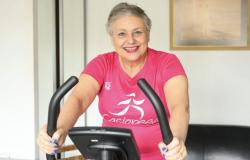“I felt like I was stuck in mud and people were walking on me. This is how the humorist Constance talks about his burnout and then of his depression in the documentary “Mental Health – Breaking the taboo”, broadcast this Tuesday evening on M6. In this film, several personalities, such as Florent Manaudou and Yannick Noah, evoke their psychiatric disorders facing the camera.
Constance had already mentioned its depression at the branch of France Inter in November 2022, after long months of absence due to hospitalization in psychiatric unit. Three suicide attempts later, the diagnosis fell: it suffers from a bipolar disorder. A mental illness of which she made the main subject of her show “inconstancy”, which will be played at the theater of the workshop, in Paris, from June 5 to 20. 20 Minutes met her.
What image did you have of mental illness before this diagnosis of bipolar disorder is made to you?
For me, psychiatry was for crazy. And depression and burnout, a form of laziness. I often said to my mother who suffered from depression “shake yourself!” ». We were educated with reflections of the type “which does not kill makes stronger”. That’s why I can’t blame people who still think that. We cannot understand what depression is as long as we have not experienced it.
You explain: “I have never experienced a worst pain than depression”. How was it manifested?
The pain is excruciating. I felt like I was dried. I could no longer get up, wash, eat or hold a conversation. I permanently ruminated atrocious things, I had anxieties, tachycardia, I was sometimes crying for a week without being able to stop. It’s completely crazy, but there is something chemical that triggers it in the brain. And it’s reassuring to know.
Has the diagnosis of bipolar disorder done you good?
At first, I lived it very badly. My grandmother was bipolar, which was called manic-depression at the time; My mother is depressed; And I have always heard that my great-grandmother, who committed suicide, was crazy and that it was shame. I told myself that I was condemned by this terrible circle of women who are crazy.
-But I managed to break this circle thanks to medicine, psychotherapy and psychiatry. With my diagnosis, I said to myself: “I am sick, I need help and there is everything you need to heal myself”.
However, you say that you have very badly experienced your stay in a psychiatric unit in the public hospital …
Yes, I think that if I had only been in public hospital, I would have had a lot of trouble getting out of it. The staff are in burnout, there is only TV and you are stuffed with medication. It’s terrible because you are not already well and we lock you in a place that looks like a prison. I was lucky to be able to go to private clinics but I am over -indebted because I put all my money in these two years of hospitalization. If my parents had not been there, I would surely be on the street today.
You speak head -on for your hospitalizations and your suicide attempts in your show. But how to make such subjects laugh?
At the psychiatric hospital, you find yourself in completely improbable situations. I was taking a medication that made me fart permanently. I was in pajamas at 9 am to make pottery, it makes no sense. There are lots of extremely funny and offbeat scenes. Speaking of all this, we give solutions and we dramatize.
To my amazement, my show is much funnier than I thought and when I heard people laugh, I said to myself “bingo!”. And then when I speak with people of the public, some say to me “since I saw your show, I agreed to take medication and I am better”. What can make more sense frankly? I find it extraordinary.
How are you doing today ?
I’m not better, I’m finally fine. Since adolescence, I have constantly fought against a death instinct but once we are diagnosed, that we have the right treatment and that we are stabilized, we really live normally. Frankly, if it had to be done again, even if it was terrible, I would do it again, because I am so happy and appeased today.








